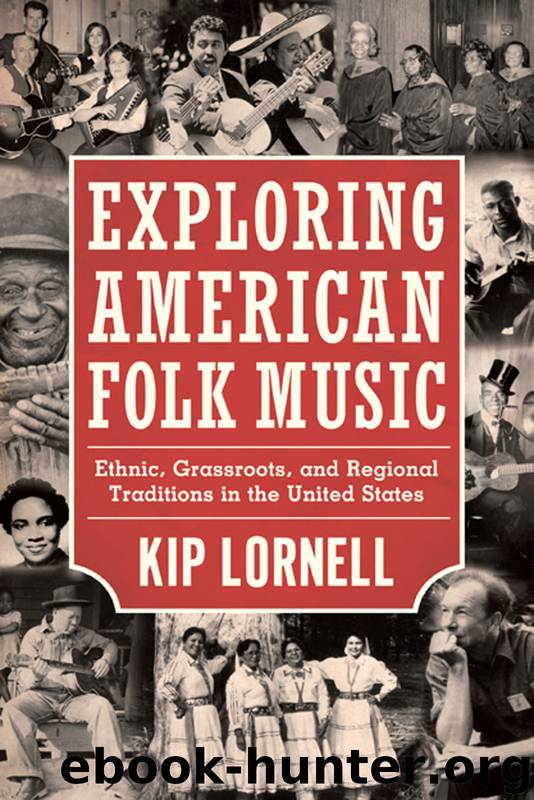Exploring American Folk Music by Kip Lornell

Author:Kip Lornell
Language: eng
Format: epub
Publisher: University Press of Mississippi
Published: 2012-09-27T04:00:00+00:00
Henry Miles Jug Band, a Louisville jug band that operated during the 1930s into the 1940s. Courtesy of Kip Lornell.
Howlin’ Wolf (Chester Burnett), Elmore James, and Walter Horton. Each of them arrived in Chicago with highly developed musical skills, full of the fire and emotional rawness that characterized the blues that developed along the Mississippi Delta. These men truly created an important new form by transforming the music of masters such as Charley Patton, Eddie “Son” House, Willie Brown, Will Shade, and Robert Johnson into the roots of rock ’n’ roll.
The transformation began in the middle 1940s, about the same time as another revolution in black music, be-bop, was capturing the other ear of jazz aficionados. The transitional records of Muddy Waters, Big Joe Williams, and Snooky Pryor with Moody Jones came out in the late 1940s and sounded like Mississippi blues in a modern setting. Around 1951 the revolution hit full force in the form of Muddy Waters’s classic band that included Little Walter Jacobs (harp), Otis Spann (piano), Big Crawford (bass), Jimmy Rodgers (second guitar), and Freddy Below (drums). Their classic Chess records virtually define Chicago blues and document a band at the height of its considerable abilities. The passion and creativity evident on “Forty Days and Forty Nights,” “Standing Around Crying,” “Hootchie Coochie Man,” and “Mannish Boy” are among the landmarks in black American vernacular music. The Chicago style emphasizes the highly dramatic lead voices of amplified guitars and harmonicas supported by the basic rhythm section of bass guitar, piano, and drums. The music was meant to be heard in clubs on the city’s predominately black South and West sides, neighborhood bars where locals came to drink and dance. Bars featuring these bands were the northern equivalent of the juke joint and they proved quite popular. This music was popular on records, too. Small labels such as Chess, Cobra, JOB, and others launched (and perhaps ultimately crashed) their businesses based on the marketability of Chicago blues. The popularity of this music continued through the middle 1950s.
Other electric blues musicians—B. B. King, Bobby Blue Bland, Little Milton—groomed their performing and recording skills in Memphis before gaining a national following. Their music is not cut in the classic Chicago mode, but rather is influenced by R&B and the gospel sounds of the 1940s and 1950s. Horn sections predominated and this music profoundly influenced soul music and the “Stax sound” that emanated from Memphis during the middle to late 1960s.
Download
This site does not store any files on its server. We only index and link to content provided by other sites. Please contact the content providers to delete copyright contents if any and email us, we'll remove relevant links or contents immediately.
The Goal (Off-Campus #4) by Elle Kennedy(13651)
Kathy Andrews Collection by Kathy Andrews(11810)
Diary of a Player by Brad Paisley(7557)
Assassin’s Fate by Robin Hobb(6197)
What Does This Button Do? by Bruce Dickinson(6194)
Big Little Lies by Liane Moriarty(5790)
Altered Sensations by David Pantalony(5092)
Pale Blue Dot by Carl Sagan(4995)
Sticky Fingers by Joe Hagan(4188)
The Death of the Heart by Elizabeth Bowen(3602)
The Heroin Diaries by Nikki Sixx(3542)
Beneath These Shadows by Meghan March(3298)
Confessions of a Video Vixen by Karrine Steffans(3296)
How Music Works by David Byrne(3257)
The Help by Kathryn Stockett(3139)
Jam by Jam (epub)(3071)
Harry Potter 4 - Harry Potter and The Goblet of Fire by J.K.Rowling(3057)
Computational Linguistics and Intelligent Text Processing: 20th International Conference, CICLing 2019 La Rochelle, France, April 7â13, 2019 Revised Selected Papers, Part I by Alexander Gelbukh(2978)
Strange Fascination: David Bowie: The Definitive Story by David Buckley(2856)
